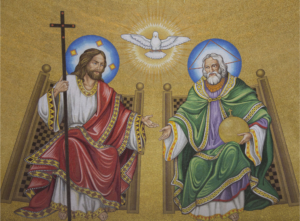Background
How often do you ask yourself the question, “What is God Up to?” Do you ever give thought to what God is doing on Planet Earth? I’m not asking the question, for the moment, in the context of what God may be doing in the lives of individual people. I am asking the question in the context of “What is the Grand Scheme?” and “Is there a purpose for mankind in this world?”
The Bible tells us there is a Grand Scheme and we have a part to play.
To understand the call on us we need to go back to the beginning. The beginning is Genesis.
In the beginning, God created the heavens and the earth. (Gen 1:1)
Then God said, “Let us make man in our image, after our likeness. And let them have dominion over the fish of the sea and over the birds of the heavens and over the livestock and over all the earth and over every creeping thing that creeps on the earth.” (Gen 1:26)
And God blessed them. And God said to them, “Be fruitful and multiply and fill the earth and subdue it, and have dominion over the fish of the sea and over the birds of the heavens and over every living thing that moves on the earth.” (Gen 1:28)
I will get to Genesis 1:27 in a minute. I want to present a pattern first.
The LORD God took the man and put him in the garden of Eden to work it and keep it. 16 And the LORD God commanded the man, saying, “You may surely eat of every tree of the garden, 17 but of the tree of the knowledge of good and evil you shall not eat, for in the day that you eat of it you shall surely die.” (Gen 2:15-17)
The man gave names to all livestock and to the birds of the heavens and to every beast of the field. But for Adam there was not found a helper fit for him. 21 So the LORD God caused a deep sleep to fall upon the man, and while he slept took one of his ribs and closed up its place with flesh. 22 And the rib that the LORD God had taken from the man he made into a woman and brought her to the man. (Gen 2:20-22)
Therefore a man shall leave his father and his mother and hold fast to his wife, and they shall become one flesh. 25 And the man and his wife were both naked and were not ashamed. (Gen 2:24)
Now, let’s get to Genesis 1:27.
So God created man in his own image,
in the image of God he created him;
male and female he created them. (Gen 1:27, emphasis mine)
What Does This Tell us?
Let me break out the importance of these passages that I have presented for your consideration. What does the Bible establish with these passages? At a minimum, the Bible establishes, at least, these 17 truths with these passages.
- God is uncreated and, therefore, always existed. In the beginning God was here to create.
- God created everything there is. Nothing existed before God created something.
- It follows then that God is sovereign. He created it all. He owns it all.
- It also follows that God is Holy (completely other than His creation). That is what holy means, set apart.
- His holiness implies a weight of glory, being undefiled, sacred, and worthy of veneration.
- At the same time God declared a purpose in the creation of the cosmos (all He created).
- The pinnacle of the purpose of creation was the creation of mankind.
- Why is man the pinnacle of God’s creation? He is the only example of creation that is declared by God to be “in the image of God”.
- Being in the image of God gives mankind higher dignity and purpose than any other portion of creation.
- That higher dignity is the reason that, from conception to death, mankind’s life is sacred. Mankind is an image-bearer.
- Man was created to be a co-ruler with God of all the lower creation.
- Man was also created to be a co-creator with God.
- The woman was the special creation of God to be the helper of man to be the co-ruler and co-creator with God.
- That act of special creation, along with the declaration of the nature of their relationship, establishes the only legitimate sexual bond between the sexes. One man, one woman, in marriage, together for life.
- An element of the creation of mankind was that God gave them a will so they could demonstrate their allegiance to God – voluntarily, through obedience.
- God retained ultimate sovereignty by placing limited but definite constraints on mankind.
- God intended man to live forever as long as he remained loyal. The only thing that could kill him was to disobey God.
There are other implications I can draw from Genesis that bear on the concept of neglecting the house of God and our salvation. But this is a blog and I want to respect the medium and not turn it into a dissertation.
Sometime soon after the beginning, mankind, the pinnacle of creation, decided with the help of the serpent (not a literal snake by the way) that they had a better idea than God’s plan. Mankind rebelled when duped by the serpent into thinking they could become like God. The result was a temporary thwarting of the plan of God. It brought death into the cosmos because of sin. The resulting corruption of mankind’s nature made him incompatible for fellowship with God’s holy nature.
Just a brief word about the serpent. Not to create a distraction but there is also an element in the record of Genesis (well the Bible as a whole) of divine creatures in the heavenlies (where do you think the serpent came from), because I am focusing on mankind in this article, so I’ll be brief.
The Hebrew word for the serpent is (nachash) and, though it literally translates into English as snake, it is a metaphorical word play; a form of triple entendre that carries the following images to the original Near Eastern audience of Genesis, as it should for us if we want to understand properly:
- A divine throne guardian
- Information from the divine realm
- A shining appearance associated with divinity i
So, Eve was not conversing with a mere snake, she was reacting to a divine (though deceitful) being from the heavenly realm who appeared to her for the purpose of derailing God’s plan for establishing a human family of co-rulers. She got duped. I’m not making excuses for them. But I am asking if any of us could have done better.
I think the primary thing we need to take away from the early chapters of Genesis ought to be that though God did not need to, he decided to create the cosmos in such a manner that he would share the ruling of it with a family of creatures, both heavenly (the hosts of heaven) and earthbound (mankind). He wanted a family of rulers, co-regents with him. Therefore, we have a purpose.
It was a risky proposition though for God that He was nonetheless willing to take. Creatures made in the image of God have a Will and are capable of both compliance and rebellion. There were (and still are) forces afoot in the heavenlies that are bent on usurping the rule of God and recruiting as many as possible to do likewise. It is nothing less than cosmic warfare and has been going on since the beginning.
The history of the World, according to the Bible, includes God’s implementation of successive steps of a plan to redeem the relationship between him and mankind and restore God’s original plan to build a family of co-rulers.
Humans rebelled. We turned away from God but that didn’t mean that God failed. He understood the risk involved with creating beings with free will. He was not surprised by the rebellion of mankind, and he went through with his plan despite the risk because he wanted a family.
The scope of this blog constrains me from going into full detail about the complete history/story of God’s dealings with mankind. But I will point you to a great book at the end of this article that will give you more details. God continues to pursue mankind to build his family and will until what he calls the fulness of time. Why?
“… because it’s his nature to seek us. He’s committed to us.” ii
Another Look at the Gospel
We join the family of God by believing the gospel. So, let’s take another look at the gospel to dispel some confusion. Within the Church many cannot articulate the gospel. And many of those who know what they believe, find themselves unable to live by the simplicity of it. They want to add requirements to it. And, outside the church the gospel is often terribly misunderstood.
Much of the problem comes because we live in a performance-based society. We measure our own value and the value of others in terms of productive contributions to either society as a whole or the segment of society in which we participate. We subscribe to the propositions that there is “no such thing as a free lunch” and “everything has a price”. The idea is that nothing of value comes our way without us earning it. It is deeply ingrained in our psyche that we must earn everything that comes our way. This is why the gospel is so hard to get our minds around.
In the Bible the gospel refers to the message of salvation. And what do we need to be saved from?
In a paragraph above I mentioned the rebellion of mankind through disobedience to the limited constraint God placed on mankind. The result (as noted in another post) was a curse placed on all creation and the judgment of the wrath of God against the sin that caused the disobedience of mankind. Creation in general needs to be saved from the curse and mankind needs to be saved from the wrath of God. The gospel is the message that leads to that salvation.
We call the gospel “good news” because it is the good news about the means of salvation. For brevity’s sake I’m going to give you only two references that explain the content of the gospel.
Now I would remind you, brothers, of the gospel I preached to you, which you received, in which you stand, and by which you are being saved, if you hold fast to the word I preached to you—unless you believed in vain. For I delivered to you as of first importance what I also received: that Christ died for our sins in accordance with the Scriptures, that he was buried, that he was raised on the third day in accordance with the Scriptures, and that he appeared to Cephas, then to the twelve. (1 Cor 15: 1-4)
Paul, a servant of Christ Jesus, called to be an apostle, set apart for the gospel of God, which he promised beforehand through his prophets in the holy Scriptures, concerning his Son, who was descended from David according to the flesh and was declared to be the Son of God in power according to the Spirit of holiness by his resurrection from the dead, Jesus Christ our Lord, through whom we have received grace and apostleship to bring about the obedience of faith for the sake of his name among all the nations, (Rom 1:1-5)
We see from these passages that:
- God sent his Son
- He was born from the line of David (as prophesied)
- God the Son became the man Jesus Christ (believe it, no one can explain it)
- He died to pay for our sins
- He actually died and was buried
- He rose from the dead (validating his claim to being God by conquering death)
- He was seen first by the twelve (then later by hundreds of people)
There is so much more than can be said but, but for the gospel, that’s it, the content in its entirety.
And therein lies the rub for most people.
It has NOTHING to do with them. It has only to do with what has been done for them. Those 7 points describe and confirm ALL that is required to put us in good standing with God. We bring nothing to the table.
… because, if you confess with your mouth that Jesus is Lord and believe in your heart that God raised him from the dead, you will be saved. For with the heart one believes and is justified, and with the mouth one confesses and is saved. (Rom 10:9-10)
You obey the gospel by believing it. No more than that. You must add nothing to it.
Did you also notice that Paul didn’t say “the obedience of comprehension”? We may not completely understand things like God becoming a man in Jesus, or how the resurrection could happen. That’s okay. God doesn’t demand we figure it all out and then get back to him to take a final exam. He wants belief. Understanding why these things are rational can wait. iii
Confess and believe! What can be simpler than that? It is your ticket to having a relationship with the King of Kings and the Lord of Lords.
And that my friends, is Eternal Life.
Now What?
Fellowship and Sharing
The act of creating gives us confidence that love and fellowship are, in fact, central to their relationship because creating is an act of sharing and benevolence. Creating flows positively from the subject (creator) to the object (creation). It is giving not taking.
Imago Dei (Image of God)
There are attributes that we share with God that are called communicable attributes. There are attributes that God holds exclusively that are called incommunicable attributes.
I want to focus on two of God’s communicable attributes here, love and fellowship. These are two aspects of the imago dei that help to explain why God has inaugurated the plan that he has. We participate in the growth of the family by sharing the love and fellowship with those with whom we come in contact.
When God called Abraham out of Ur of the Chaldees he told him that he was going to produce from him a nation of people through whom the entire world would be blessed.
I will surely bless you, and I will surely multiply your offspring as the stars of heaven and as the sand that is on the seashore. And your offspring shall possess the gate of his enemies, and in your offspring shall all the nations of the earth be blessed, because you have obeyed my voice.” (Gen 22:17-18)
This is part of the mandate handed down by God in the Garden of Eden, see (Gen 1:28-31). A lot had happened since then, most of it failure on man’s part, but God was still looking for that family.
But notice the hook. “… because you have obeyed my voice.” The promise was made in light of Abraham’s obedience to God’s voice. He believed and he followed where God led. Abraham followed but most of his descendants did not. That is why God’s commendation of Abraham became a hook for his descendants — they failed repeatedly to obey God’s voice.
The failure was so complete and habitual that God himself, in the person of his son Jesus, had to come and set things right. Jesus supplied the justification to make man right with God. He supplied the redemption to rescue mankind. Jesus supplied the change to the nature of man required to accomplish the plan. He sent the Spirit to empower mankind to succeed at the mandate. In short, he supplied it all and, as he departed bodily, restated the mandate.
And Jesus came and said to them, “All authority in heaven and on earth has been given to me. Go therefore and make disciples of all nations, baptizing them in the name of the Father and of the Son and of the Holy Spirit, teaching them to observe all that I have commanded you. And behold, I am with you always, to the end of the age.” (Matt 28:18-20)
And that, friend, is how we advance God’s plan.
Endnotes:
[i] Heiser, Michael S. The Unseen Realm: Recovering the Supernatural Worldview of the Bible (pp. 90-91). Lexham Press. Kindle Edition.
[ii] Heiser, Michael S. What Does God Want? (pp. 7-8). Blind Spot Press. Kindle Edition.
[iii] Ibid. (p. 58).
If you’ve spent a lot of your life in church, you might think you already know the answer. You might know parts of it, but I can guarantee you’ll see a lot that’s new here. This isn’t your run-of-the-mill “Christianity 101” book. Unfortunately, the thing that most often gets in the way of the wonder of the story is religion, and that isn’t what this book offers. And if you’ve never been in a church or heard much about the Bible, don’t worry. You’ve got nothing to unlearn or re-learn. It’s all fresh. That makes you an ideal reader.
So what does God want? Best-selling author, Dr. Michael S. Heiser, shows readers that the answer is pretty simple. God wants YOU. That might surprise you. You may doubt it. That’s okay. But it’s the right answer. But it isn’t enough of an answer. You can’t get a sense of how amazing and profound the answer is by just that one sentence. There’s actually a long, remarkable story behind the answer—one that isn’t well known by most people interested in the question.

Logos Bible Software
The Logos Bible Study app is a powerful Bible study and sermon prep platform. It allows you to study Scripture, commentaries, devotionals, Bible dictionaries, and more from your computer, tablet, or phone. If you want to know the Creator of the Universe intimately, you want this app.

Elevated Faith
Are you looking for apparel or swag? We picked Elevated Faith because of the diversity of their offerings. They offer some great ideas for gifts for others and treats for yourself.












2 Responses
You have laid out a great description of God’s intent for us to plainly see! This reminds me of what Jeff Morehead said in a sermon ” we live by declaration, not explanation “. God’s decrees combined with His grace ( the cross ) give me great comfort and hope!
Thanks brother Doug.
Doug, I really like the way you distilled the mountains of information contained in the first few chapters of Genesis here. Some of the takeaways are that a wise and loving God created all of this. We see chaos. But he had a purpose in it. And by implication, there is purpose in our lives, no matter what the circumstances.
Keep it up.